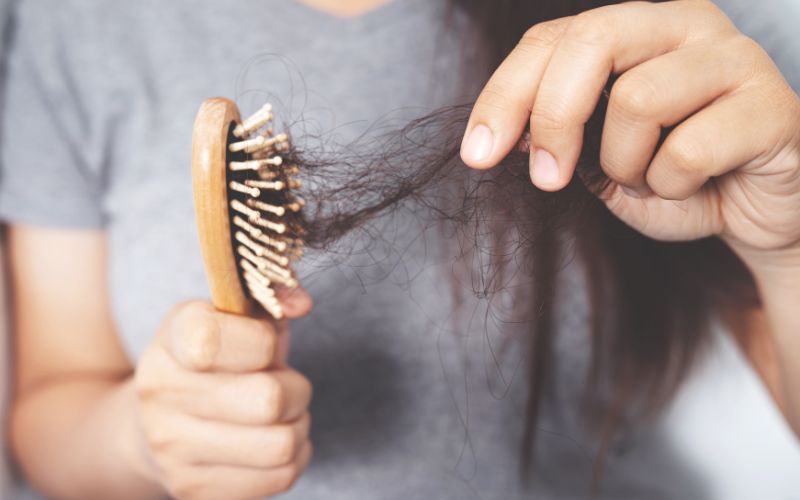Can Magnesium Deficiency Cause Hair Loss?
This article explores the ins and outs of inadequate magnesium intake and its relative impact on your hair health.
Everyone dreams of long, shiny, and healthy hair.
Even after trying numerous things, the most common complaint is hair loss. It can occur due to underlying health issues, irritation with hair products, or even your diet.
Indeed, deficiency of magnesium can trigger hair loss.
Various studies presented valid proof stating how inadequate consumption of minerals can be dangerous for your hair.
So, can magnesium deficiency cause hair loss? It’s a marketing strategy to sell more magnesium supplements or hair care products.
Let’s dig into the link between magnesium and hail loss to understand more…
The Link between Magnesium and Hair Loss

Your hair health depends on multiple factors. What kind of hair products do you use? What’s your hair routine?
But the most important factor is your diet. What you eat determines your locks. Thus, hair specialists advise you to consume foods with more minerals, vitamins (Vitamin D Deficiency and Hair Loss), and protein.
In this respect, the mineral ensures stronger, healthier, and smoother hair.
When your magnesium intake lessens, it degrades the body’s function, which might also affect hair growth.
Magnesium for Hair Loss: Two Main Functions
Magnesium intake can improve your hair health.
To get the most out of the mineral, understand how it impacts your hair production.
Here’s how magnesium improves your hair health.
#1. Preventing Calcium Buildup
The mineral prevents the build-up of calcium on your scalp. Excess calcium blocks your hair follicles.
This turns your scalp flaky, dry, and rough. It causes hair loss as well. In the long run, calcium buildup can stimulate scalp inflammation.
In contrast, an adequate presence of magnesium prevents calcium deposits. It promotes blood circulation while preventing such further possibilities. This ensures your bone absorbs sufficient calcium.
#2. Protein Synthesis
The mineral even promotes protein synthesis. How? Hair is a kind of protein.
The better protein synthesis, the better hair health. Eventually, it leads to a better hair cycle with normal hair growth. Protein synthesis produces melanin, which prevents premature hair greying as well.
There’s a direct link between hair and magnesium. The mineral determines multiple functions related to hair health.
In the absence of this micronutrient, the body’s process will suffer. It can cause hair loss.
So, let’s get back to the question. Can low magnesium cause hair loss? Let’s understand the phenomenon in detail.
Can Magnesium Deficiency Cause Hair Loss?
In general, magnesium isn’t that popular for haircare. Experts talk about biotin, keratin, vitamin, and more.
But they don’t discuss magnesium for hair growth with similar emphasis.
Well, fun fact! Magnesium does wonders to your hair.
It maintains almost 700 metabolic processes in the human body. Most of them impact your hair growth cycle. It even determines the quality of follicles growing on your head.
In short, the mineral has an interesting link with your hair. Inadequate magnesium intake can trigger hair problems for sure.
A closer analysis can offer more details on how magnesium deficiency causes hair loss.
How Does Lack of Magnesium Cause Hair Loss?
Inadequate magnesium can trigger calcium buildup on your scalp. This will make your scalp dry, flaky, and rough.
It even obstructs the normal blood circulation, preventing the normal flow of nutrition to your hair.
Naturally, it will make your hair cycle rapid. You would lose hair at a rapid rate while your body produces new hair at a normal pace. This will eventually make your locks thinner.
Lack of magnesium even lessens protein synthesis, which affects the quality of your hair.
Evidently, magnesium deficiency causes hair loss. Magnesium hair oil may benefit hair health in this case or you may require a supplement of the mineral.
Firstly, you need to identify if there’s even a case of magnesium deficiency triggered hair loss.
How to Identify Hair Loss Triggered by Magnesium Deficiency?
If you have low magnesium level symptoms and intense hair loss, you may be losing hair due to the lack of minerals.
You should talk to your hair specialist for confirmation on how can lack of magnesium cause hair loss.
Knowing the low magnesium symptom can help distinguish other hair losses from magnesium deficiency caused hair loss.
Here’s what does magnesium deficiency feel like…
Low magnesium deficiency symptoms include:
- Nausea
- Vomiting
- Irritation
- Weakness
- Mood swings
- Loss of appetite
- Intense muscle cramps
If you’ve got these symptoms along with hair loss, the chances are high you have magnesium deficiency triggered hair loss.
Apart from that, low magnesium can even lead to low bone density, nerve problems, gastric issues, muscle function, and more.
These symptoms can also occur due to other underlying conditions. So, it’s always recommended to have a consultation with your doctor.
You can ask him — Can a lack of magnesium cause hair loss? He will provide a personalized analysis considering your case. It will be better for your hair health.
Certain health conditions are also more likely to cause magnesium deficiency triggered hair loss.
Conditions Triggering Magnesium Deficiency Hair Loss
Some health conditions or physical situations cause the overuse of magnesium or obstruct the absorption of the mineral. This would cause hair loss either way.
Let’s have a look at some of the health conditions that might be triggering hair loss:
- Type 2 Diabetes
- Expecting mothers or nursing
- Medicines, such as diuretics and antibiotics
- Extreme loss of magnesium due to excess urination or sweating
- Age – older adults are more vulnerable to magnesium deficiency
- Gastrointestinal disorders, such as Crohn’s disease or celiac disease
Usually, people underestimate the impact of their dietary choices on hair health.
Whatever you feed yourself determines your hair health. In the above cases, consult your doctor for specialized treatment.
Now, you know magnesium deficiency can cause hair loss. But, let me tell you, it can even prevent further hair loss.
Here’s how supplementing magnesium is related to hair loss.
Magnesium Supplements and Hair Loss

If magnesium is the mineral behind your hair loss, treating magnesium deficiency can resolve the issue.
Though the result would be slow, as it would have affected the hair cycle, gradually it would improve.
You need to begin with your diet.
Have more magnesium-rich foods. The top options include the following:
- Tofu
- Beans
- Bananas
- Fatty fish
- Avocados
- Leafy greens
- Dark chocolate
- Nuts and seeds
Above mentioned magnesium sources provide a sufficient quantity of the mineral. If it takes longer to get adequate results, magnesium oil for hair growth can prevent hair loss.
You might also benefit from knowing what type of magnesium is best for hair loss and the right dosages.
ALSO READ: How Does Biotin Help Hair Growth?
How Many Milligrams of Magnesium is Recommended Daily?
The mineral has a prime role in hair growth. It is responsible for the growth, division, and creation of body cells.
On top of that, it plays a key role in more than 700 body processes. In short, your body requires magnesium in an adequate quantity.
Category | Age Group | Recommended Dietary Allowance (RDA) |
| Adult men | 19-51+ years | 400-420 mg |
| Adult Women | 19-51+ years | 310-320 mg |
| Pregnant Women | 19-51+ years | 350-360 mg |
| Lactating Women | 19-51+ years | 310-320 mg |
According to your category and age group, you should follow RDA.
It will resolve hair loss due to magnesium deficiency while resolving other magnesium deficiency-related problems.
Never exceed dosages. It won’t benefit you immediately. Instead, it will cause myriads of side effects including GI problems, vomiting, nausea, and more. So, avoid overdosing on magnesium.
Taking in adequate amounts of magnesium can also reverse some other hair issues.
Can Magnesium Reverse Grey Hair?
Magnesium stimulates protein synthesis, which creates melanin, the compound responsible for hair color.
So, magnesium deficiency can easily cause premature hair greying.
In such a case, reversing magnesium deficiency can resolve the problem. It accelerates the production of melanin, making your hair greyer.
You can check out magnesium oil for hair before and after results. It reduces hair greying while getting your hair back to its natural color.
Whether you have golden, red, brown, or black hair, reversing magnesium deficiency can resolve your hair problems.
Now, if you’re this far into the blog, you know some things.
We discussed how can a magnesium deficiency cause hair loss and what you can do about it? Now, it is time for an overview.
Let’s Sum Up
Hair loss is the major problem of the current generation. But most end up ignoring the root cause of hair loss. Their attention remains on hair products.
In certain cases, deficiency of a mineral triggers hair loss.
In fact, a lack of magnesium is one of the major reasons behind hair loss.
If you’ve lost more than 100 hair strands by brushing your hair once and you have low magnesium symptoms, magnesium deficiency may be the causing factor.
In such a case, you should consume more magnesium-rich foods. You can even apply magnesium oil for hair growth or take magnesium supplementation. Just follow the right dosages for the best results.
Hopefully, you’ve gained some useful insight from the blog, Tell us what else you would like to know in the comments section below.